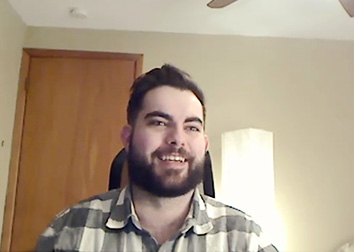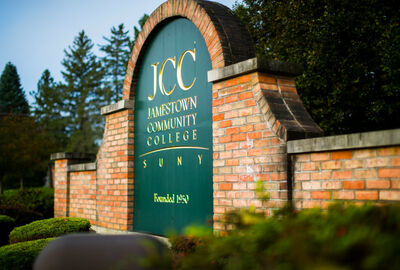Jonathan Antle of Allegany came to SUNY Jamestown Community College after his first year at an out-of-state university as a pre-med student proved less fruitful than he had hoped. Antle only saw JCC as being close to home and a stepping stone to a four-year degree. He soon learned he had room to explore his career path, and ultimately shifted his educational pursuit toward research fields.

and grad student at University at Buffalo
“At first I was taking biology courses at the (Cattaraugus County) campus, and then I took my general chemistry courses there as well,” Antle recalled. “Organic chemistry was only offered on the Jamestown Campus, so I started commuting to Jamestown.”
Antle took classes from Corey Damon, associate professor of chemistry, and Sean Nowling, assistant professor of physics. He credits them both with teaching interesting classes that sparked his curiosity in areas he had previously not considered – like mechanisms, and mathematics. Antle decided to change course from pre-med to a Chemistry major. His enjoyment of Math was a surprise, because Antle hadn’t considered it a strength in high school, and it ultimately became his minor.
“High school math is really arithmetic, and you’re not really learning what mathematics really is,” Antle shared. “At the college level, you get insight about proofs and an understanding that the math you learn in high school is quite different from what mathematics really is.”
Damon connected Antle with a professor at St. Bonaventure University, who was looking for a summer student to help with research. Damon kept in touch with his student, and continued to be part of his studies by contributing to a paper Antle wrote called “Applying Density Functional Theory to Common Organic Mechanisms: A Computational Exercise.”
“He [Antle] was able to publish his undergraduate research, which started as part of a summer pipeline straight from here to SBU,” Damon explained. “In chemistry, publishing as an undergraduate is huge for getting into grad school, which was Jon’s goal.”
Antle said the transfer to St. Bonaventure was easy because “they offer a transfer scholarship there.” He continued his studies at another campus that was close to home, while still learning and growing from his professors at JCC. While at St. Bonaventure, Antle started doing research with a professor at the University at Buffalo, and that led him to pursue his grad studies there.
“The main work I do is on PFAS, which are per-and polyfluoroalkyl substances that are used in nonstick cookware and firefighting foams — they’re a really good surfactant, and so they have a bunch of applications,” Antle explained. “They’re called ‘forever chemicals,’ and now we’re realizing that these aren’t good for any living organisms because they are very persistent in the environment.”
Antle’s research aims to predict the neural toxicity of PFAS, with a goal to develop a model that can be used by other groups and agencies to be able to determine the toxicity of combinations of PFAS in an environment.
“I work on the computational side, where we’re trying to use machine learning to build a model that would predict that,” he said.
In reflecting on his JCC experience, Antle said he would strongly recommend it to students who are just getting started.
“College is getting more and more expensive — I think it’s an extremely well-educated decision to go to JCC first,” Antle said. “The level of education that I received at JCC was very comparable to what I received at a four-year university,” Antle said.
Antle describes his college experience as having gotten off to a slow start. Over time, he learned that paying attention in class, doing homework and “asking or coming up with good questions to ask your professor” improved his abilities as a student.
“The thing is, classes get harder, but you will become a better learner as long as you do what you’re supposed to be doing,” Antle advised. “Start out as best you can, and that will just make a compounding effect as you’re finishing your studies and you’ll be a much better student at the end of it.”
Watching students’ interests in science expand as their abilities as students grow is something Damon enjoys.
“As a chemistry professor, it’s exciting to see a student come to class and fall in love with the field,” Damon said. “It’s been a pleasure to watch Jon’s career path evolve.”
JCC offers more than 60 programs and transfer opportunities. Learn more at sunyjcc.edu.

